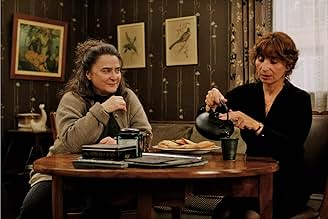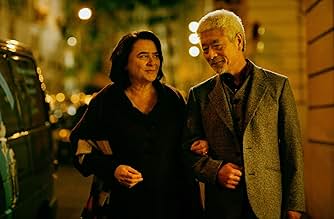Le Hérisson
- 2009
- Tous publics
- 1h 40min
Paloma, 11 ans, a décidé de se suicider pour son anniversaire. Peu avant la date fatidique arrive un nouvel habitant dans l'immeuble, M. Ozu. Leur rencontre ainsi que l'amitié naissante avec... Tout lirePaloma, 11 ans, a décidé de se suicider pour son anniversaire. Peu avant la date fatidique arrive un nouvel habitant dans l'immeuble, M. Ozu. Leur rencontre ainsi que l'amitié naissante avec la concierge arrêteront-elles son noir projet ?Paloma, 11 ans, a décidé de se suicider pour son anniversaire. Peu avant la date fatidique arrive un nouvel habitant dans l'immeuble, M. Ozu. Leur rencontre ainsi que l'amitié naissante avec la concierge arrêteront-elles son noir projet ?
- Réalisation
- Scénario
- Casting principal
- Récompenses
- 10 victoires et 7 nominations au total
Avis à la une
But the young director Mona Achache managed to transpose the subtlety of the written word, in that she focused on the three main characters perfectly. They are three delicate souls, perceived by others as "odd", eccentric, different: Renée, the caretaker, apparently dowdy and ignorant, on the contrary very cultured and hiding a sensitive soul, Paloma , the "complicated", but in reality deep young girl, simply disregarding the void adult world, and the amazing Kakuro, the prototype of what a real man should be, refined in his soul, respectful, tactful. And you come to ask yourself why such high human qualities are viewed as odd, while they should be the normal way of living! In today's standardized, vulgar world, I perceived the movie as an effective antidote, supporting with strength the value of the uniqueness of the single human being. It is also a praise of delicacy and slowness, of the magic of a single spoken word or a single kind gesture, or a single soft glance: a few things happen, and a few things are said, simply because for a full life, we don't need to see or hear many things , we need a few but good things.
Despite its slowness, the movie is never boring, on the contrary I felt raptured by the delicacy and the calmness of these characters, wonderfully interpreted by three talented and actors. I identified myself also with the little Paloma, probably because she reminded me at her own age, when I liked being on my own, finding my secret refuge, where I could stay alone with my thoughts, as I grew up I realized how people could have seen my as a "difficult", even problematic child, but also fully realized how it is easy to be judged because different from the mass, but how important to keep your real inner precious world alive. Go and see it, you will be enchanted by these three simple, plain, but magic characters.
For those who don't know, the film defines a hedgehog as a prickly-on- the-outside, cuddly-on-the-inside critter that is often misjudged. Our three characters all fit this description in some manner. Paloma (Garance LeGuillermic) is an 11 year old girl who plans to kill herself on her 12th birthday because no one understands her and her life is filled with what are the minor inconveniences of being an 11 year old - her mother talks to plants more than she talks to her, her father is a distracted workaholic, and her self-centered teenage sister is, well, a self-centered teenager. Madame Renee Michel (Josiane Balasko) is the building's caretaker. Self-described as old and ugly, she lives the life of quiet desperation, hiding with her cat and massive library of books and chocolate. The building's new tenant is Kakuro Ozu (Togo Igawa), a mysterious and elegant man who immediately sees through Madame Michel's prickly exterior.
Paloma spends much of her day documenting by video camera the goings on in her life and of those in her building. She often adds her insightful and humorous narrative to the scene as it occurs. Her view on life and its possibilities begins to change as she observes and gets to know Madame Michel and Mr. Ozu, and more importantly, observes their interactions.
The underlying storyline of an 11 year old girl contemplating suicide can be quite disturbing, but director Achache never really lets that occur. Instead we focus on very simple acts of kindness and subtle smiles and gestures that indicate life can be rewarding and worthwhile. I also found Madame Michel's surrender to the state of invisibility to be quite disturbing, but her awakening to be fascinating. She had not been rejected by society as much as simply overlooked.
Unlike many French movies that bombard us with rapid fire, overlapping exchanges, this one instead relies on patience and a sharp eye ... think of it as the slight squeeze while holding a loved one's hand.
The movie presents a good contrast between the girl's disillusionment with her posh but superficial world and the concierge's appreciation of what little she has, and showing how the concierge is able to develop a relationship with a Japanese widower who moves into the apartment building. The girl's filming her sister throughout the goldfish bowl is a metaphor for the new look that she's taking at her bourgeois existence. In the end, the girl does start to reconsider her suicidal plans. Achache made a very good movie, one that I truly recommend.
The concierge character is a tour de force. The way she starts, as an obscure caretaker, moving the trash cans of the rich neighbors out on the sidewalk --only five huge de luxe apartments at her charge-- retrieving the empty containers the next morning and always moody and dry (as she herself puts it to Paloma, the girl, "the perfect concierge" according to the accepted urban legend about concierges in people's mind), and then because of her unexpected interacting with that precocious girl and the impeccable Japanese new neighbor, her subtle but unstoppable changes are something to be seen (as are also the changes in Paloma and the perfect Japanese new neighbor).
The little girl's mother, psychoanalyzed and medicated, watering her plants and talking to them (I do it too) with much more love and infinite care than to her own daughter, is fully drawn in a very succinct and accurate way.
Paloma is left alone to her own devices, and they only consist of an old fashioned movie camera --her father's gift to her-- perennially in front of her face (she films everything that moves) and her drawings (delightful) where she expresses her most inner thoughts.
This is a perfect example of a French film --I ADORE this type of French cinema--where very little happens but in such an intimate and delicate communion with the viewer that it absorbs one's mind completely, and doesn't let go till the very end, in the most poignantly and unexpected possible way, as it's the case in the present film. See it, it's totally worth your while.
I only wish you'll enjoy it as much as I did. Precious.
The title comes form the definition of a hedgehog as a prickly-on- the-outside, cuddly-on- the-inside critter that is often misjudged. And that definition applies to several characters in the story though it is most directly connected to bourgeoisie apartment house concierge Renee Michel (Josiane Balasko), a middle-aged and sour hermit who lives to mop the floor, distribute mail, and to give you a wary eye to passersby. The building is inhabited by rich people, a fact we learn from the narrator of the story - Paloma Josse (Garance Le Guillermic), an eleven-year-old girl disturbed by her privileged life in Paris. Her father Paul (Wladimir Yordanoff) is distracted by his government job while her mother Solange (Anne Brochet) drinks champagne with anti-depressants while talking to her plants, and her sister Colombe (Sarah Le Picard) focuses her shallow life on a pet goldfish. She decides she will kill herself in 165 days on her 12th birthday and begins to document the hypocrisy of the adults in her apartment building with her father's old 8mm camcorder. Her harsh judgments do not seem to include Renee: though they are at opposite ends of the socioeconomic spectrum Paloma senses something unusual about Renee, explores her apartment and discovers the extensive secret library in Renee's back room, and that the often untidy appearing and distant matron reads Tolstoy to her cat Leo. Renee's hedgehog appearance does indeed contain a cuddly inside, a fact that is revealed when a new tenant - Kakuro Ozu (Togo Igawa) moves in and he and Paloma realize they are kindred spirits. Mr. Ozu is a wealthy Japanese businessman and he strikes up a friendship with Paloma as they discuss their shared curiosity for the downstairs concierge woman and their delight in playing the game Go with one another. Kakuro's attention to and kindness for Renee creates changes: Renee is instructed by the maid Manuela Lopez (Ariane Ascaride) to have her hair done and to wear a new dress when Renee reluctantly accepts Kakuro's invitation to dinner. As Paloma observes the changes Kakuro creates in both Renee and in herself, her own coming of age becomes a much less pessimistic prospect. 'Planning to die doesn't mean I let myself go like a rotten vegetable. What matters isn't the fact of dying or when you die. It's what you're doing at that precise moment.' And from there the story moves like that free floating water lily - passing on through life enlightened by its presence.
Josiane Belasko, Garance Le Guillermic, and Togo Igawa are brilliant in their roles. The script is quiet, intelligent and ultimately deeply touching, but it is the direction of Mona Achache that polishes this little gem to a glow. Clearly this is one of the finest films of the past decade.
Grady Harp
Le saviez-vous
- AnecdotesTogo Igawa (Kakuro Ozu) learned his French lines in the movie phonetically. He does not speak French in real life.
- GaffesWhen Paloma feeds the anti-depressant pill to the fish, the fish dies instantly. The fish would not die this fast.
- Citations
Paloma Josse: Planning to die doesn't mean I let myself go like a rotten vegetable. What matters isn't the fact of dying or when you die. It's what you're doing at that precise moment.
- ConnexionsFeatured in On demande à voir: Épisode datant du 24 juin 2009 (2009)
- Bandes originalesRequiem en Ré mineur: Confutatis maledictis
Written by Wolfgang Amadeus Mozart (as W.A. Mozart)
Performed by the Slovak Philharmonic Orchestra (as Orchestre Philharmonique de Slovaquie) and the Slovak Philharmonic Chorus (as Choeur Philharmonique de Slovaquie), conducted by Zdenek Kosler (as Zdeneck Kossler)
Meilleurs choix
- How long is The Hedgehog?Alimenté par Alexa
Détails
- Date de sortie
- Pays d’origine
- Sites officiels
- Langues
- Aussi connu sous le nom de
- L'Élégance du hérisson
- Sociétés de production
- Voir plus de crédits d'entreprise sur IMDbPro
Box-office
- Montant brut aux États-Unis et au Canada
- 707 945 $US
- Week-end de sortie aux États-Unis et au Canada
- 39 276 $US
- 21 août 2011
- Montant brut mondial
- 14 695 775 $US
- Durée1 heure 40 minutes
- Couleur
- Mixage
- Rapport de forme
- 2.35 : 1
Contribuer à cette page



































